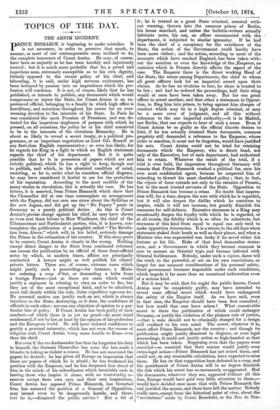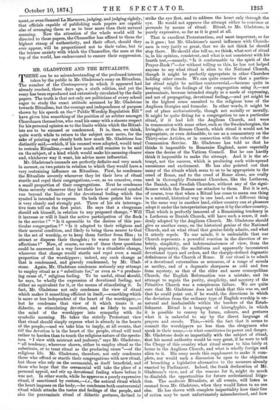TOPICS OF THE DAY.
THE ARNIM INCIDENT.
PRINCE BISMARCK is beginning to make mistakes. It 1 is not necessary, in order to perceive that much, to assume, as most of our contemporaries seem inclined to do, the complete innocence of Count Arnim. He may, of course, have been as unjustly as he has been harshly and injuriously treated ; but it is much more probable that he, a proud and imperious man, extremely susceptible as to his own dignity, bitterly opposed to the recent policy of his chief, and labouring, it is said, under high nervous excitement, has been betrayed by passion into an imprudence which his pro- fession will condemn. It is not, of course, likely that he has published, or intends to publish, any documents which would compromise or injure the State, for Count Arnim is an ex- perienced official, belonging to a family in which high office is hereditary, and notorious throughout his career for an over- weening devotion to the interests of his State. In Paris he was considered the most Prussian of Prussians, and was de- tested for the imperious singleness of purpose with which he pressed, on all occasions, the policy he or his chief conceived to be to the interests of the victorious Monarchy. He is about as likely to reveal a secret treaty, or a political pro- gramme, or an important negotiation as Lord Odo Russell or any first-class English representative ; or even less likely, for he regards his King in a light in which no English statesman regards the chief of his department. But it is quite possible that he is in possession of papers which are not strictly political, which he has a right to keep, though not to publish, and which, in his ulcerated condition of mind, smarting, as he is, under what he considers official disgrace, he may have considered it lawful to use for the protection of his reputation. According to the most credible of the many stories in circulation, this is actually the case. He has letters, it is asserted, from Prince Bismarck which show that the Chancellor did at one time contemplate an arrangement with the Papacy, did not care one straw about the Syllabus or the new dogma, and did get up the "No Popery" panic in Germany as a purely political device. As this is Count Arnim's precise charge against his chief, he may have shown or even sent these letters to Herr Windhorst, the chief of the Ultramontane and Particularist parties, who, it is known, con- templates the publication of a pamphlet called "The Revolu- tion from Above," which will, in his belief, seriously damage the Prince in the estimation of his country. If this story prove to be correct, Count Arnim is clearly in the wrong. Nothing except direct danger to the State from continued reticence can excuse the publication by an official of those demi-official notes by which, in modern times, affairs are principally conducted. A lawyer might as well publish his clients' private letters. There are, of course, extreme cases which might justify such a proceeding—for instance, a Minis- ter ordering a coup d'etat, or demanding a bribe from a foreign Power—just as there are cases which would justify a regiment in refusing to obey an order to fire, but they are of the most exceptional kind, and to be admitted, must fall clearly within the rule, Salus reipublicce supremo lex. No personal motive can justify such an act, which is always injurious to the State, destroying, as it does, the confidence of officials in each other; nor can any objection of opinion to a par- ticular line of policy. If Count Arnim has been guilty of such conduct—of which there is as yet no proof—he must stand condemned, if not by law, at least by the opinion of his profession and the European world. He will have violated confidence to gratify a personal animosity, which has not even the excuse of religious zeal, Count Arnim being more hostile to Rome even than his chief.
But even if the ex-Ambassador has thus far forgotten his duty to himself, the German Chancellor has none the less made a blunder in taking so violent a course. He has not recovered the papers he desired ; he has given all Europe an impression that there are papers of which he is afraid ; he has weakened his position with the Emperor, and he has deepened that dread of him in the minds of his subordinates which invariably ends in leaving those who inspire it alone, with no trustworthy re- sources except their own eyes and their own inspirations. Count Arnim has opposed Prince Bismarck, has thwarted him, has assumed the position of a General of Opposition, may intend even to be dangerously hostile, and there- fore he is,—dismissed the public service ? Not a bit of
it; he is treated as a great State criminal, arrested with- out warning, thrown into the common prison of Berlin, his house searched, and unless the bulletin-writers actually fabricate news, his son, an officer unconnected with, the ' department, is subjected to similar ignominy. If he had been the chief of a conspiracy for the overthrow of the State, the action of the Government could hardly have been more violent ; and the action, according to most of the accounts which have reached England, has been taken with- out the sanction or even the knowledge of the .Emperor, an omission which in Prussia directly affects the aspect of the case. The Emperor there is the direct working Head of the State, the nexus among Departthents, the chief to whom all great officers look for an impartial award upon their claims. As he has no rivalries to fear, he alone is trusted to be fair ; and had he ordered the proceedings, half their sting would at once have been taken away. But for one great officer to arrest another, and that other a statesman in Opposi- tion, to fling him into prison, to bring against him charges of conduct which may be in a high degree criminal, or may be a mere error of judgment, and all this without reference to the one impartial authority,—it is in Madrid, not Berlin, that one expects to hear of such a scene. Even if Count Arnim be as guilty as the official Gazette desires to hint, if he has actually retained State documents, common propriety still demanded a reference to the Emperor, whose order or sanction, it must not be forgotten, would have justified his acts. Count Arnim could not be tried for retaining documents which the Emperor, who is direct head, not only of the Executive, but of each department, had authorised him to retain. Whatever the result of the trial, if a trial is ever held, the impression throughout Germany will remain that Prince Bismarck crushed a political foe, once his own most confidential agent, because he suspected him of intending to thwart his most cherished policy ; that, in fact, the regime of force extends not only to the enemies of Prussia, but to the most trusted servants of the State. Opposition to Prince Bismarck has become a crime. No doubt that impres- sion will, for a time, deepen the awe with which he is regarded, but it will also deepen the dislike which he contrives to inspire, while it will not increase, but greatly diminish his resources for self-defence. Excessive sternness in a King may occasionally deepen the loyalty with which he is regarded, or at all events, the fidelity which is so often its substitute, but sternness of this kind from equal to equal can only tend to. make opposition internecine. It is a return to the old days when statesmen staked their heads as well as their places, and when a Minister who was superseded was lucky if he saved either his fortune or his life. Risks of that kind demoralise states- men, and a Government in which they become common is sure to assume an Oriental type, and become infected with Oriental feeblenesses. Nobody, under such a re'gime, dares tell the truth to the powerful, or act on his own convictions, or forget for one moment considerations of his personal safety. Good government becomes impossible under such conditions, which impede it far more than an occasional indiscretion even of a serious kind.
But it may be said, that for aught the public knows, Count Arnim may be completely guilty, may have intended to reveal some official secret which would have endangered the safety of the Empire itself. As we have said, even in that case, the Emperor should have been first consulted ; but how Could that case have arisen ? What conceivable secret is there the publication of which could endanger Germany, or justify the violation of the plainest rule of justice, —that a man should not be criminally charged for a design still confined to his own mind. The secret, whatever it is, must affect Prince Bismarck, not the country ; and though its publication might justify dismissal in disgrace, or even legal proceedings, it could not justify action so high-handed as that which has been taken. Supposing even that the papers were essential—so essential that their seizure would justify even extra-legal action—Prince Bismarck has not seized them, and could not, on any reasonable calculation, have expected to seize them. He has on that supposition been defeated in a coup, and the punishment of Count Arnim will in no degree diminish the risk which his arrest has so enormously exaggerated. Had the documents, whatever they are, appeared without all this fuss, Europe would have paid very little attention to them,— would have decided once more that with Prince Bismarck the end justified the means, and there have left the matter. Nobody really cares, except from the historical point of view, about the "revelations" made by Count Benedetti, or the Duc de Gra-
m.ont, or even General La Marmora, judging, and judging rightly, that officials capable of publishing such papers are capable also of arranging them so as to bear more than their natural meaning. Now the attention of the whole world will be directed to these papers, the Chancellor has affixed to them the highest stamp of authenticity, and their effect, should they ever appear, will be proportioned not to their value, but to the intense anxiety with which the Chancellor, the man at the top of the world, has endeavoured to ensure their suppression.







































 Previous page
Previous page